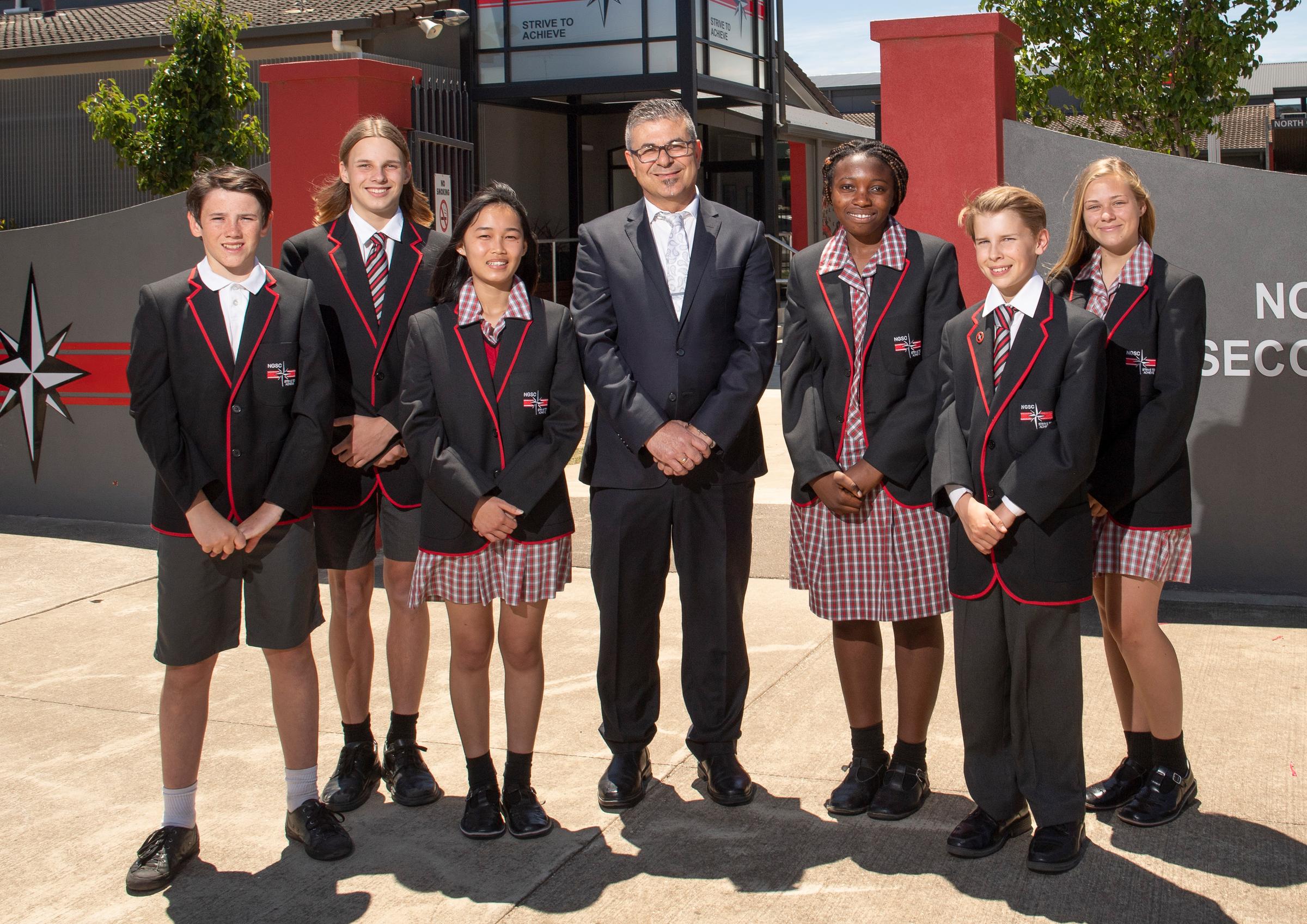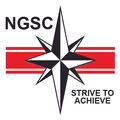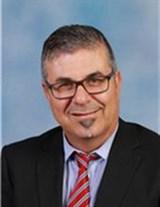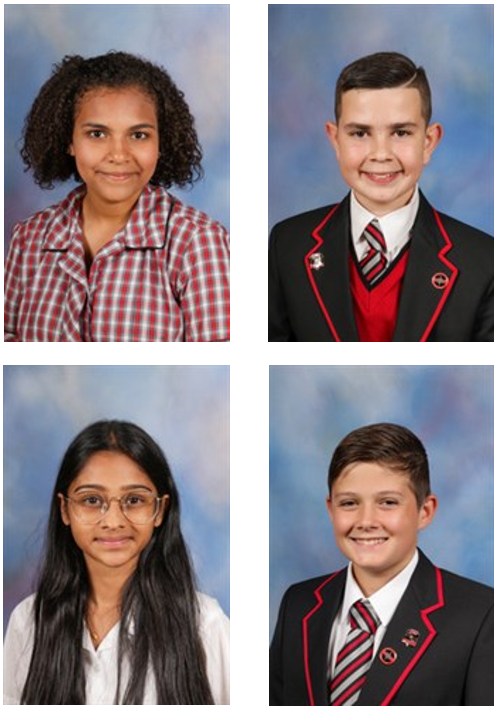
PRINCIPAL'S REPORT
Mr Nicholas Adamou
Principal
Key Dates
| 2/11 to 6/11 | VCAL Interviews |
| 9 Nov | Year 11 Study Day |
| 10/11 to 13/11 | Year 11 Exams |
| 10/11 to 30/11 | VCAA Exams |
| 16/11 to 20/11 | Year 11 into Year 12 Orientation |
| 23/11 to 26/11 | Year 10 into Year 11 Orientation |
| 23/11 to 26/11 | Year 7 to 9 Exams |
| 25 Nov | Last Day Year 10 & 11 VCAL |
| 27 Nov | Assessment and Reporting Day |
| 30/11 to 4/12 | Year 8 STEM Project |
| 7 Dec | Years 7-9 last day of classes |
| 8 & 9 Dec | Grade 6 Orientation Program |
| 9 & 10 Dec | Activities |
| 11 Dec | Beach Day |
2021 School Captains
North Geelong Secondary College prides itself on always placing the students at the centre of everything we do. This statement is more prevalent this year than any other year in our living memories.
Our vision is to empower all of our students to learn and achieve, experience high quality teaching practice and the best conditions for learning, equipping them with the knowledge, skills and dispositions for lifelong learning and shaping the world around them.
The North Geelong Secondary College vision for learning, recognises the fundamental importance of empowering students and the contribution that student voice, agency and leadership make, to improve student outcomes, health and wellbeing. It outlines our aspiration for all students to achieve and grow as learners and to generate their own course for lifelong learning.
Empowering our students for the future
We know our world is changing rapidly and this year, in particular, with the Covid-19 pandemic we have all experienced major changes in the way we live and the way we work. We have seen lots of change in contemporary communications and transportation, in new ways we access and create information and in emerging enterprises that place consistent emphasis on new capabilities like critical and creative thinking and problem solving. We also know coronavirus, climate change, new technologies and a new geopolitical landscape, make our future hard to predict and open to great opportunities and possibilities. Navigating such rapid change requires resilience, adaptability and perseverance.
At NGSC we recognise the need for ‘learning for life’ and the need for students to develop the ‘Capabilities’ – Critical and Creative Thinking, Ethical, Intercultural, Personal and Social. These cross disciplinary capabilities empower students to become resilient, independent learners and problem solvers. It is these skills that are developed, practised and demonstrated when students have the opportunity to exercise voice, agency and leadership in designing, developing and assessing their own learning.
Student agency is also paramount to the success of our school community. Therefore, all students are encouraged to develop their leadership skills in order to lead and support fellow students, and also to advantage the wider community. Opportunities to develop these qualities are provided through a range of learning experiences, both in their everyday school life and in targeted leadership programs throughout their time at the school. There are many student roles throughout the year levels that offer support and leadership for other students in the school community, through School Captains, Student Representative Council (SRC), Year Level and House Captains, and in specific fields of interest, such as iLeaders and Excellence In Sports. Every student is encouraged to build their own sense of themselves as leaders and to contribute to the life of the College in a very positive way.
School Captains are the most significant student leaders in the school community. School Captains are expected to take an active role in all aspects of the school community and work with the school Administration, Principal Team, Leadership Team, School Council and others, to achieve the best possible outcomes. They must be approachable, reliable and trustworthy, and their duties involve communication with staff and students, public speaking at assemblies, school events, writing for the school magazine, attend School Council meetings, just to name a few. School Captains must be involved in a range of co-curricular activities, such as Sports, The Arts, Cultural/Community and Academic areas, and be positive role models for all within the wider school community. They are the school’s greatest ambassadors to the outside world.
It is with great pleasure, that I present the 2019 School Captains to the NGSC school community.
Congratulations to the 2021 School Captains!
Jessikah Tidd – School Captain
Mitchell Cazaly – School Captain
Stefan Javni – Sports Captain
Edita Salcinovic – Community Captain
Joab Low – Academic Captain
Sophie Lawless – Arts Captain
The Principal Team and staff are looking forward to working with our 2021 School Captains to continue the great work at North Geelong Secondary College. Welcome on board to the NGSC Leadership Team.
North Geelong Secondary College SCHOLARSHIP PROGRAM
“Providing opportunities for excellence”
2021 Year 9 and 10 Scholarship Recipients
Every year, the College allocates four scholarships to the value of $4500.00 for NGSC Year 8 students going into Years 9 and 10. The students are selected based on their written application, multiple references and their ability to articulate their vision on how they could lead the student body and contribute to the life of the school.
The Year 9 and 10 scholarship selection process has now been completed and the selection panel has recommended the following students to the Principal as the winners. The Principal Team and the staff are looking forward to working closely with these young leaders, aiming to improve our NGSC school community.
Congratulations to the following students:
- Jana Badr, 8C
- Brodie Orrock, 8D
- Rakshiga Jeyarasa, 8H
- Henry Reed, 8C
Child Safety Code of Conduct
NGSC is committed to the safety and wellbeing of children and young people. Our school community recognises the importance of, and a responsibility for, ensuring our school is a safe, supportive and enriching environment which respects and fosters the dignity and self-esteem of children and young people, and enables them to thrive in their learning and development.
This Code of Conduct aims to protect children and reduce any opportunities for child abuse or harm to occur. It also assists in understanding how to avoid, or better manage, risky behaviours and situations. It is intended to complement child protection legislation, Department policy, school policies and procedures and professional standards, codes or ethics, as these apply to staff and other personnel.
The Principal and school leaders of NGSC support the implementation and monitoring of the Code of Conduct, and will plan, implement and monitor arrangements to provide inclusive, safe and orderly schools and other learning environments. The Principal and school leaders will also provide information and support to enable the Code of Conduct to operate effectively.
All staff, contractors, volunteers and any other member of the school community involved in child-related work are required to comply with the Code of Conduct by observing expectations for appropriate behaviour below. The Code of Conduct applies in all school situations, including school camps and in the use of digital technology and social media.
Acceptable behaviours
As staff, volunteers, contractors, and any other member of the school community involved in child-related work, individually, we are responsible for supporting and promoting the safety of children by:
- upholding the school’s Statement of Commitment to child safety at all times
- treating students and families in the school community with respect, both within the school environment, and outside the school environment as part of normal social and community activities
- listening and responding to the views and concerns of students, particularly if they are telling you that they or another child has been abused or that they are worried about their safety/the safety of another child
- promoting the cultural safety, participation and empowerment of Aboriginal and Torres Strait Islander students
- promoting the cultural safety, participation and empowerment of students with culturally and/or linguistically diverse backgrounds
- promoting the safety, participation and empowerment of students with a disability
- reporting any allegations of child abuse or other child safety concerns to the school’s leadership
- understanding and complying with all reporting or disclosure obligations (including mandatory reporting) as they relate to protecting children from harm or abuse.
- if child abuse is suspected, ensuring as quickly as possible that the student(s) are safe and protected from harm.
Unacceptable behaviours
As staff, volunteers, contractors, and any other member of the school community involved in child-related work, we must not:
- ignore or disregard any concerns, suspicions or disclosures of child abuse
- develop a relationship with any student that could be seen as favouritism or amount to ‘grooming’ behaviour (for example, offering gifts)
- exhibit behaviours or engage in activities with students which may be interpreted as abusive and not justified by the educational, therapeutic, or service delivery context
- ignore behaviours by other adults towards students when they appear to be overly familiar or inappropriate
- discuss content of an intimate nature or use sexual innuendo with students, except where it occurs relevantly in the context of parental guidance, delivering the education curriculum or a therapeutic setting
- treat a child unfavourably because of their disability, age, gender, race, culture, vulnerability, sexuality or ethnicity
- communicate directly with a student through personal or private contact channels (including by social media, email, instant messaging, texting etc) except where that communication is reasonable in all the circumstances, related to school work or extra-curricular activities or where there is a safety concern or other urgent matter
- photograph or video a child in a school environment except in accordance with school policy or where required for duty of care purposes
- in the school environment or at other school events where students are present, consume alcohol contrary to school policy or take illicit drugs under any circumstances
Celebrating World Teachers’ Day at NGSC
Friday, 30 October, is World teachers’ Day. It is a day where we take a moment to reflect and recognise Victoria's and in particular NGSC’s outstanding teachers. Our teachers’ dedication and enthusiasm is great.
This year's World Teachers' Day theme, 'Teachers: leading in crisis, re-imagining the future' reflects the incredible contribution teachers have made in 2020.
The coronavirus (COVID-19) pandemic has asked teachers all around the world to change their routines and adjust how they teach, to ensure students have the support they need to continue learning at NGSC. Our teachers have performed well above the call of duty.
World Teachers' Day is an opportunity for our community to say 'thank you' to the teachers who continue to make such a profound difference to young lives throughout Australia and the world.
I take this opportunity and on behalf of the NGSC community, I thank our NGSC teachers for the outstanding work they do day in, day out.
The school’s priorities in Term 4
Priority 1 – Mental health and wellbeing
Our highest priority is the mental health, safety and wellbeing of every student and member of staff. Students from disadvantaged backgrounds and many students with disabilities have been disproportionately impacted across all areas of their education.
All available resources will be effectively mobilised to ensure support for every student, including our most vulnerable.
This means encouraging and sustaining motivation for learning and supporting the development of personal and social capabilities of students as part of the curriculum. It includes re-engaging students and families, where needed, and implementing targeted strategies for at-risk cohorts.
This also means ensuring support for our school staff, who have sustained efforts through multiple transitions in modes of teaching and learning delivery.
Priority 2 – Learning
Some students have been able to progress more quickly in their learning in the remote and flexible learning environment, others have maintained their rate of progress, and some have, despite their best efforts and those of their families and teachers, fallen behind.
Our priority is to ensure those who have fallen behind can catch up and those who have progressed significantly can continue to be extended and stretched in their learning.
Student voice and student agency should inform how we provide continuity of learning and support for every student in this environment.
Priority 3 – Transitions
Term 4 is a critical period, particularly for the children moving from Grade 6 into Year 7, and those in Year 12 moving into employment or further education and training. Students in other year levels will also prepare for a change of teachers and new classmates.
A key focus is to make every effort to ensure each of these end-of-year and beginning-of-year transitions occurs as successfully as possible. This includes finding contextually appropriate ways to conduct orientations and end-of-year celebrations and ensuring transition information captures additional details as necessary.




